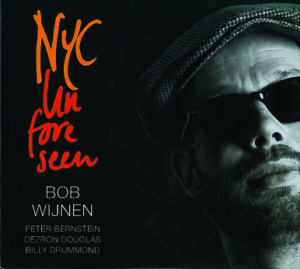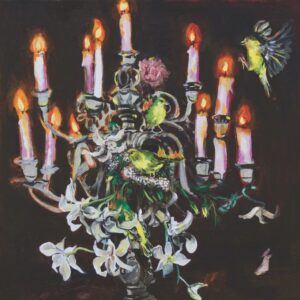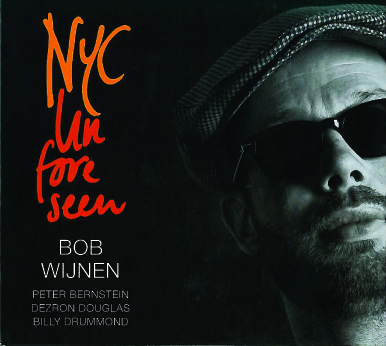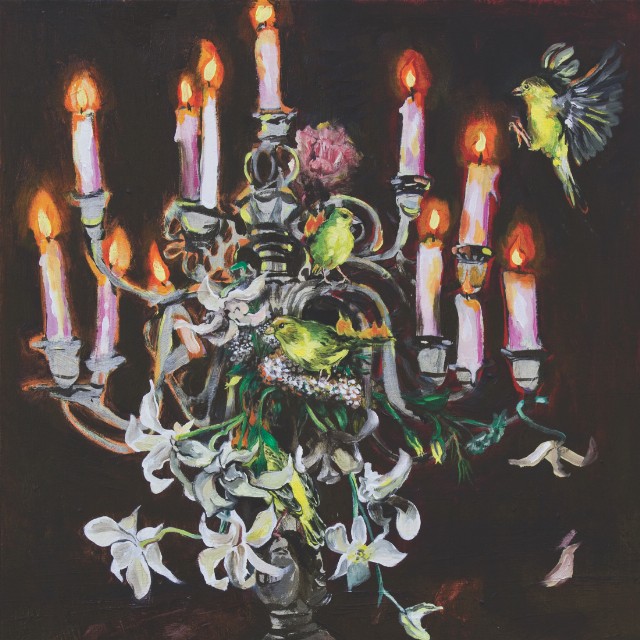Nineteen-year-old Norwegian nocturnal (read as: dark) pop sensation Aurora climbs out of her cocoon and flies off, albeit dourly and with dusk trailing her demonically, toward a totally dance-friendly heaven with her first full-length recording, All My Demons Greeting Me as a Friend. Aurora Aksnes, as she is properly known, uses her first foray into full-fledged fecundity to trip heavily through a gamut of human emotions and the life that accompanies them using apt metaphors and brilliant, sometimes crisp and always tasty production values to bring her concerns to the fore. It also helps that her vocals are gorgeous and galling at the same time—an aspect of her output that the music press has already inevitably compared to Björk and Regina Spektor—in a way that seems to allude to the multiplicity of ruminative voices out there in the world, all longing for attention and consumption by humans looking for meaning, dance-like transcendence and cool pop songs like “Conqueror.”
Bob Wijnen NYC Unforeseen (Voordekunst)
Pianist Bob Wijnen just released a debut recording of traditionally-rooted yet adventurously played jazz music. The record’s called NYC Unforeseen and it demonstrates Wijnen’s competency as a long sought after accompanist and sideman while also giving substance to the proposition that Wijnen’s compositions deserve the attention of a restive jazz audience in search of nuance, superior chops and the more-than-occassionally-shocking-sureshot solo. Featuring other nowadays notables including guitarist Peter Bernstein, bassist Dezron Douglas and stick man Billy Drummond, NYC Unforeseen is for the most part restrained and cool—drifting chordal structures are balanced by punctuated and exploratory bass lines; Drummond’s shuffling and shamanic drum playing moves the sound along in a laconic yet confident way. Wijnen’s playing, especially when contrasted and off-set by Bernstein’s glassy sense of musicality has a windily seasonal sense to it as if summer eschews percussive outlets for a more melodic feel that dwells in tree tops and long afternoons, as in track number two, “Treehouse.” (August March)
Your Friend Gumption (Domino)
The tunes on Gumption fairly intensify the weird and obscure style that Taryn Miller introduced listeners to on the more straightforward Jekyll/Hyde. Miller’s voice is ethereal while she belts it out. It’s a mysterious combination, like a less sad Chan Marshall. Taking advantage of a recording studio, Gumption has less folk-rock than the home recording released as Jekyll/Hyde. Lotsa loops and a greater ambient feel help carry songs like “To Live With” and “Desired Things” into avant-garde territory. Taryn Miller’s new work is difficult but worthwhile and not only for her astounding voice, but for gems like the minimalist groove “Come Back From It”, and the last last track “Who Will I Be In the Morning,” a paean to self identity over a John Cage-worthy thinker’s composition. Gumption is either ahead of its time or way overthought. Decide for yourself when Your Friend shows up at the Co-Op next month. (Geoffrey Plant)






